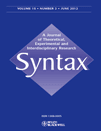
Syntax-A Journal of Theoretical Experimental and Interdisciplinary Research
Scope & Guideline
Fostering Cutting-Edge Research in Theoretical and Experimental Linguistics
Introduction
Aims and Scopes
- Theoretical Syntax:
The journal emphasizes theoretical frameworks and models that explain syntactic phenomena, including movement, agreement, and case assignment across various languages. - Cross-Linguistic Comparisons:
Research often involves comparative studies that highlight syntactic similarities and differences among languages, contributing to the understanding of universal grammar. - Experimental Approaches:
The journal encourages the use of experimental methodologies to investigate syntactic questions, providing empirical evidence that supports or challenges theoretical claims. - Interdisciplinary Research:
It integrates insights from related disciplines such as psycholinguistics, morphology, and semantics, fostering a broader perspective on syntactic analysis. - Morphosyntactic Interfaces:
Exploration of the interfaces between syntax and other grammatical components, such as phonology and semantics, is a key focus area. - Language-Specific Studies:
In-depth studies of specific languages and their unique syntactic features are prevalent, contributing to the overall understanding of linguistic diversity.
Trending and Emerging
- Complex Syntactic Structures:
There is an increasing focus on the analysis of complex syntactic phenomena, such as scrambling, ellipsis, and movement, particularly in lesser-studied languages, which adds depth to theoretical discussions. - Interface Studies:
Research exploring the interactions between syntax and other linguistic domains, such as semantics and phonology, is gaining traction, showcasing the interdisciplinary approach of contemporary syntax research. - Experimental Syntax:
The rise of experimental methodologies, including psycholinguistic studies and acceptability judgments, is becoming more prominent, reflecting a shift towards data-driven investigations. - Morphological Influences on Syntax:
Emerging studies on how morphological factors influence syntactic structures, particularly in languages with rich morphology, are attracting attention and expanding the scope of syntactic theory. - Syntactic Variation and Change:
Research examining syntactic variation across dialects and language change over time is increasingly featured, providing insights into the dynamic nature of syntax.
Declining or Waning
- Traditional Syntactic Paradigms:
Research adhering strictly to older syntactic theories, such as transformational grammar, has seen a decrease, as newer frameworks gain prominence. - Descriptive Syntax:
There has been a waning interest in purely descriptive studies of syntax without theoretical implications, as the journal increasingly favors studies that contribute to theoretical advancements. - Language-Specific Anomalies:
Papers focusing on rare or highly idiosyncratic syntactic phenomena in specific languages have become less frequent, as the trend shifts towards more universally applicable findings. - Static Syntax:
The exploration of static syntactic structures, without considering their dynamic and contextual aspects, has declined, reflecting a growing interest in syntax as a process. - Syntactic Theory Without Empirical Evidence:
Studies that lack empirical support or experimental validation are less common as the journal emphasizes the importance of data-driven research.
Similar Journals

Journal of Comparative Germanic Linguistics
Pioneering Research in the Heart of Germanic LinguisticsThe Journal of Comparative Germanic Linguistics, published by SPRINGER, is a leading peer-reviewed academic journal that has significantly contributed to the fields of linguistics and arts and humanities since its inception. With an impressive impact factor and consistently ranked in the Q1 category in both Arts and Humanities (miscellaneous) and Linguistics and Language, this journal serves as a vital platform for scholars to disseminate their research on comparative studies in Germanic languages. The journal's scope encompasses a broad range of topics, fostering an interdisciplinary dialogue that enhances our understanding of language development, structure, and evolution. Although currently not an open-access journal, the Journal of Comparative Germanic Linguistics ensures that its high-quality articles reach a global audience, appealing to researchers, professionals, and students who are keen to explore the nuances of Germanic linguistics. With its strategic address in the Netherlands, the journal stands at the forefront of linguistic research, providing valuable insights that contribute to the academic community's knowledge base.

SKASE Journal of Theoretical Linguistics
Expanding the Frontiers of Linguistic ThoughtSKASE Journal of Theoretical Linguistics, published by the SLOVAK ASSOCIATION STUDY ENGLISH-SKASE, is a distinguished Open Access journal that expands the horizons of linguistic research and theoretical frameworks. With its ISSN N/A and E-ISSN 1336-782X, the journal has established itself as a pivotal resource for scholars in the field, achieving a commendable Q2 ranking in Linguistics and Language as of 2023. The journal, which has been in continuous publication since 2017, actively publishes innovative research studies, reviews, and theoretical discussions, easing access to groundbreaking work for academics and practitioners alike. Based in Slovakia, it connects a rich heritage of linguistic scholarship and is indexed in Scopus, ranking alongside its peers in both Arts and Humanities and Social Sciences categories. The SKASE Journal of Theoretical Linguistics is crucial for anyone interested in the evolving landscapes of linguistics, serving as an invaluable platform for disseminating knowledge and fostering collaboration amongst researchers worldwide.

CogniTextes
Exploring the Mind's Language.CogniTextes (ISSN: 1958-5322) is an esteemed open access journal published by the Association Française de Linguistique Cognitive, dedicated to the exploration of cognitive linguistics and its intersection with textual interpretation. Since its inception in 2007, CogniTextes has been a vital platform for disseminating cutting-edge research that delves into the cognitive processes underlying language use, enhancing our understanding of linguistics in a cognitive context. This journal not only fosters scholarly communication among researchers and professionals but also serves as a valuable resource for students keen on advancing their knowledge in cognitive linguistics. With its headquarters located at the University of Lille 3 in France, CogniTextes encourages contributions from a diverse spectrum of disciplines, thereby enriching the field of linguistics and cognitive studies. The journal's commitment to open access ensures that its findings are readily available to a global audience, thus facilitating knowledge sharing and academic discourse.

Journal of Slavic Linguistics
Fostering Insights into Slavic Phonetics and SyntaxJournal of Slavic Linguistics, published by SLAVICA PUBLISHERS, is a key academic resource dedicated to the exploration of Slavic languages and linguistics. Established to provide a comprehensive platform for scholarly research, this journal addresses the intricate dynamics of Slavic phonetics, syntax, semantics, and discourse, making significant contributions to both theoretical and applied linguistics. The journal holds an impact factor that reflects its value in the linguistic community, particularly as it is ranked in the Q4 category in Linguistics and Language for 2023. With a focus on a wide range of topics within the field, the Journal of Slavic Linguistics serves as an essential reference for researchers, educators, and students alike, fostering an appreciation and deeper understanding of Slavic linguistic phenomena. Although currently not an Open Access journal, it remains accessible to a broad audience keen on engaging with contemporary linguistic scholarship.
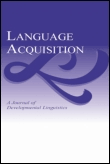
Language Acquisition
Exploring the intricacies of language acquisition.Language Acquisition, published by ROUTLEDGE JOURNALS, TAYLOR & FRANCIS LTD, is a leading academic journal dedicated to the interdisciplinary study of language development and acquisition. With an ISSN of 1048-9223 and E-ISSN 1532-7817, this peer-reviewed journal caters to professionals, researchers, and graduate students in the fields of linguistics and educational psychology. The journal boasts an impressive 2023 Scopus ranking of Q1 in Linguistics and Language and Q2 in Education, reflecting its high impact and relevance within academic circles. Notably, it is indexed among the top 15% of journals in Language and Linguistics, showcasing its significance in contributing knowledge to these vibrant fields. Although currently not open access, Language Acquisition makes a profound impact on understanding how individuals acquire language, facilitating discussions on pedagogical strategies, cognitive development, and sociolinguistic factors. The journal's historical and ongoing contributions since its inception in 1990 reinforce its position as a vital resource for advancing research and theory related to language acquisition.

JOURNAL OF MEMORY AND LANGUAGE
Transforming Understanding of Language through MemoryJOURNAL OF MEMORY AND LANGUAGE, published by Academic Press Inc Elsevier Science, is a prestigious journal dedicated to advancing the understanding of cognitive processes related to language and memory. With an impact factor that underscores its authority and relevance, the journal has achieved remarkable recognition, ranking in the Q1 quartile across multiple disciplines such as Artificial Intelligence, Experimental and Cognitive Psychology, Linguistics and Language, and Neuropsychology and Physiological Psychology, as of 2023. With its origins tracing back to 1985, the journal continually provides a platform for high-quality research and innovative studies that intersect diverse fields including cognitive science and linguistics. Although it does not offer open access, the Journal of Memory and Language serves as an essential resource for researchers and professionals seeking to explore the intricate interplay between memory and language. Make sure to access state-of-the-art research that not only informs theoretical frameworks but also has practical implications in real-world situations.
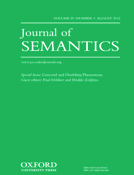
Journal of Semantics
Innovating Research in Language and Humanities.Journal of Semantics, published by Oxford University Press, is a prestigious academic journal that stands at the forefront of the fields of Artificial Intelligence, Linguistics, and Arts and Humanities. With an impressive Impact Factor and ranking among the Q1 quartiles in its respective categories as of 2023, this journal caters to researchers and practitioners committed to exploring the intricate relationships between meaning, language, and computational models. The journal is indexed within the Scopus database and ranks highly, indicating its significant contribution to academic discourse. With a timeline spanning decades from 1982 to 2024, the Journal of Semantics aims to publish high-quality, innovative research articles that stimulate rigorous debate within the semantic community. Although it does not currently offer Open Access options, the journal's physical and digital presence ensures it reaches a wide readership.
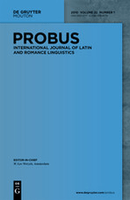
PROBUS
Shaping the future of language scholarship.PROBUS is a prestigious journal in the field of Linguistics and Language, published by De Gruyter Mouton. With its ISSN 0921-4771 and E-ISSN 1613-4079, PROBUS serves as a significant platform for innovative research, exploring diverse aspects of language study. Based in Berlin, Germany, this journal has established itself as a leading source of academic knowledge, evidenced by its Q1 quartile ranking in 2023 and notable positions in Scopus, including Rank #258 in Arts and Humanities and Rank #304 in Social Sciences relative to its peers. Encouraging scholarly discussion and interdisciplinary collaboration, PROBUS aims to foster understanding and advancement in the field, making it an essential resource for researchers, professionals, and students alike. Although it does not offer open access, the journal ensures wide dissemination of important findings through robust academic subscriptions.

Snippets
Advancing interdisciplinary dialogue through insightful research.Snippets is an esteemed academic journal published by LED EDIZIONI UNIV, known for its commitment to advancing knowledge across various disciplines. The journal, which carries the ISSN 1590-1807, serves as a crucial platform for researchers, professionals, and students in the fields of humanities, social sciences, and applied sciences. With an increasing emphasis on open-access content, Snippets offers a wealth of information and insights aimed at fostering academic dialogue and innovation. Although specific metrics like impact factor and H-index are yet to be established, the journal is dedicated to providing high-quality research outputs that contribute to the enrichment of scholarly pursuits. Based in Milan, Italy, Snippets welcomes contributions from a diverse range of perspectives, thus enhancing interdisciplinary collaboration and promoting a deeper understanding of contemporary issues.
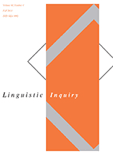
LINGUISTIC INQUIRY
Illuminating the Pathways of Linguistic ThoughtLINGUISTIC INQUIRY is a premier journal published by MIT PRESS, representing a critical platform for the advancement of research in the fields of linguistics and language studies. With an impressive Q1 category ranking in both linguistics and language disciplines for 2023, and ranking #149 in Arts and Humanities and #174 in Social Sciences according to Scopus metrics, this journal stands at the forefront of academic conversations around language theory, analysis, and application. LINGUISTIC INQUIRY caters to a diverse audience of researchers, professionals, and students, providing a robust forum for original research articles and theoretical discussions that push the boundaries of our understanding of language. While the journal currently does not offer open access, it remains an essential resource for those engaged in cutting-edge linguistic research. The journal's continuous publication since 1996 demonstrates its long-standing commitment to linguistic scholarship and innovation.